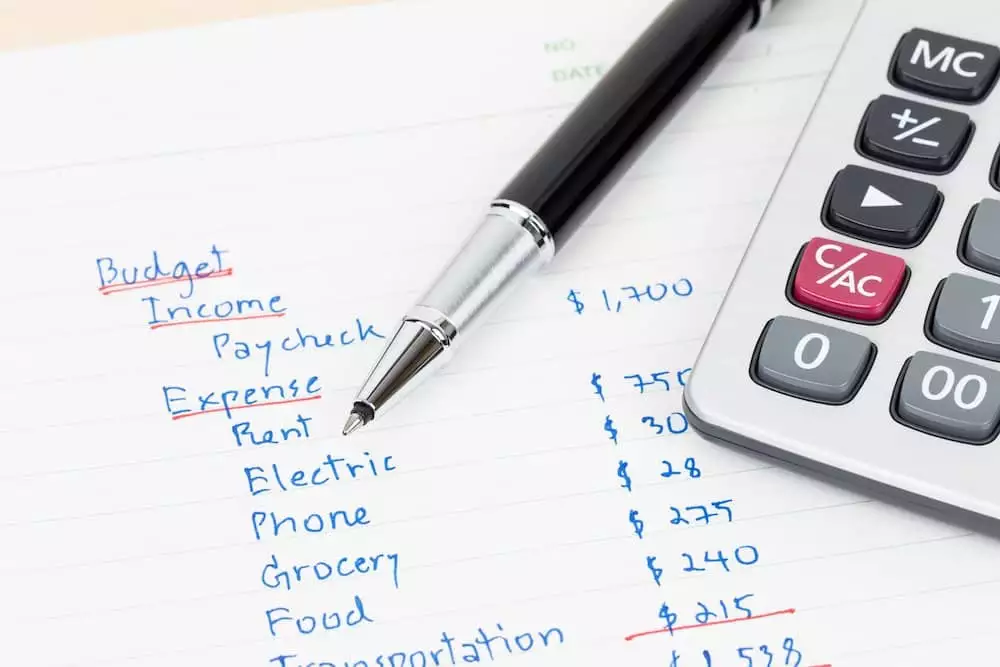Creating a budget is a great way to visualize your cash flow and expenses – to see where your money is going, and ultimately find ways to save money. In this guide, we’ll tell you everything you need to know about how to budget your money.
Naturally, a lot of people’s eyes glaze over, and they start to yawn when the subject of how to make a budget or creating a budget to save money comes up. Too many people incorrectly assume it’s a lengthy, complicated task, which involves lots of math or accounting, specific jargon and terms, and is more hassle than its worth. But, they couldn’t be more wrong! In fact, budgeting is pretty simple and easy, with a great number of benefits. The real tricky part is sticking to the budget plan and keeping your spending and expenses in check.
In this article, we’ll highlight some basic considerations for how to budget your money, and provide a simple, step-by-step guide to help you with setting up a budget for the first time. Whether you’re single, married, have lots of kids – it doesn’t matter, you can budget your personal spending, your household funds, or anything in between. The principles we’ll explain here are simple and versatile. We’ll also discuss the benefits of using a budget, how to track your progress on staying within budget, and provide some tips and information for times where you just need a bit of extra help making ends meet.
As always, our specific information is based on the financial practices and standards of Canada. However, especially in the context of budgeting, pretty much all of the information can be applied to almost any country or jurisdiction, as very little of it has to do with specific laws, regulations, or customs – just basic personal finance.
Things to Consider When Making a Budget
There are several factors to consider when you are setting up a budget for the first time. These don’t need to be overly complicated, but you should give them some thought, because they’ll play a large role in how useful your budget is, and how easy or difficult budgeting will be for you.
Budgeting Plan Level Of Detail
A budget can be as simplistic or as detailed as you would like it to be. The point is to do what makes sense for you, and how you manage your money. Some people like to account for every penny they spend, pulling information from checking account and savings account statements, credit cards, and similar, and putting it all into one place. Add to that tracking cash spending, and you can easily start to find the process getting very complex and time-consuming.
At the same time, some level of detail is essential, or the budgeting process won’t be terribly useful. You need to strike a balance that makes sense for you, in terms of categorizing and keeping track of expenses, and what categories you use for budgeting purposes. The example we’ll walk through later in our step-by-step guide is designed to be a “middle ground” example of how to budget your money, something that will work for most people or families, with a moderate level of detail, but you can certainly simplify it further, or go into greater detail, to suit your own needs and habits.
Budgeting and Paycheque Planning
Your pay schedule is an important factor in how you ultimately decide to budget. If you are paid weekly, biweekly, twice monthly, or monthly, you may wish to adjust your budgeting period of process to be based on when you are paid. Likewise, setting up a weekly budget might be silly if you’re paid biweekly, and are mostly concerned with where your money goes. And regardless of your pay schedule, most recurring bills – utilities, for example – are still billed on a monthly basis, with the date usually dictated by the date of your account creation, and not by the calendar.
If you routinely have cash flow issues and trouble paying your bills, a weekly, detailed budget is probably going to be the best choice, even if you are paid biweekly. If cash flow isn’t really a problem, and you’re more into budgeting for the purpose of seeing where your money goes, and ways to save money, or to ensure you don’t overspend in particular categories, then a monthly budget may make more sense. Just consider your pay schedule, and that of anyone else whose income is part of the budget, and how that relates to your expenses and cash flow.
Purpose Of Budgeting
Really, the overall purpose or reason for budgeting is going to be a big consideration when working out how to budget your money. As mentioned above, if cash flow is the major concern, then you’re going to want to have a more detailed, week-by-week or even day-by-day breakdown of your income and expenses. If you’re really looking for opportunities to trim a few dollars here and there from different categories of expenses, you’ll likewise probably want a fairly detailed budget plan.
On the other end of things, if you’re just looking for a rough way to manage your spending in certain categories, or ensure your income is aligned with how much you can afford to spend each month, you might opt for a less-detailed, big-picture kind of budget approach. What you intend to get out of the process of developing a household budget, and using that budget on an ongoing basis, should be one of the primary drivers of the level of detail, categorization, tracking, period, and frequency of your budget and related activities.
How To Manage Money Effectively
Another important consideration is what method you are going to use to manage your budget. Basic budgeting can be done on a simple piece of paper or in a notebook. It can also be done via Excel or other spreadsheet programs with relative ease (the bonus here is you don’t need to do any math manually; you can do it all within the program). There is also an excellent book on Amazon titled "Budgeting: How to Make a Budget and Manage Your Money and Personal Finances Like a Pro" which has great reviews. You can also find many excellent free and premium apps, programs, and online services that offer budgeting services. Some also enable direct links with your checking, savings, and other accounts, saving you a lot of time in manually monitoring and reconciling your budget each period. Obviously, whatever you choose is going to depend on your own comfort with technology, and what you think will be easiest, the least time consuming, and provide the most benefit for you.
With that said, our step-by-step guide is agnostic to these methods, and more or less walks you through the process of how to make a budget without regard to exactly how or where you write down or input the numbers, categories, data, or ongoing updates and reconciliation of the budget against your expenses.
Step-by-Step Guide: How to Make a Budget
Creating a budget to save money is really easy. We’ve broken it down into a few simple steps that you can apply whether you’re budgeting in great detail or just at a high level, on paper, in Excel, or through an online service or bank.

After reviewing this guide, determine what budgeting period and level of detail you wish to use for your budget.
Create a list of your existing expenses for the month, broken down to the period you choose for budgeting (e.g., if you are budgeting weekly that is fine, but you still need to capture your monthly expenses, so put your 4 weeks of budgets into a one-month block).
Categorize each expense into a reasonable category, based on the level of detail you want in your budget. Typical categories people use are things like utilities, food, household goods, insurance, auto/gas, rent/mortgage, subscriptions/memberships, health spending, and similar.
Determine how much of your income you currently allocate to each expense or category, and how much you ideally want to allocate. For some things, there’s no option – if your rent is $700 per month, you should budget that amount, even if you wish it would be less. The main areas where you can adjust downward (or upward) are more controlled/discretionary categories like food, utilities, clothing, household goods, etc. This is really the main step in determining how to budget your money.
Most people don’t buy things like clothes, furniture, and similar every week, or even every month necessarily. We recommend creating expense categories that reflect your ideal or current spending in categories like this – so that at least a weekly or monthly portion of your income is being put towards these purchases for when they do occur – even if you don’t physically separate the money out from your general bank account funds. This can be accomplished by determining how much you estimate you spend monthly or yearly on clothes, for instance, then dividing by the number of months (12) or weeks (52), depending on your budget period and how you totaled your estimated spending.
Now, to monitor your spending, you should create a ledger/list. Your budgeted amounts can appear as the “balance” you have to spend, from which you draw down on each recorded transaction. Or you can keep that separate, and just record your income and expenses/categories, and reconcile at the end of the month against your separate budget breakdown for each category. It all depends on your own level of commitment and level of detail (as well as how automated the process is – if you’re using an app that does all this for you, it’s very easy).
That’s really all there is to creating a budget to save money! Looking at income and timing, determining what you have to or want to spend, and then tracking or reconciling that against actual expenses each period, and adjusting/saving/reducing where you can.
Benefits of Creating a Budget to Save Money
There are many benefits to creating a budget – though most of them require you both create and actually USE the budget in order to realize the greatest benefit. Some of the most common and easily attained benefits from creating a budget to save money and then using that budget on a regular basis include:
Gain visibility to where your income is going each week or month.
Find areas where you are over-spending your budget, and determine why and how to get that spending in line (or adjust your budget accordingly).
Plan for future expenses, vacations, special purchases, or savings with greater ease.
Save money by identifying your expenses in each area, and challenging yourself to decrease them.
Ensure you have sufficient cash flow and funds remaining to pay routine bills.
Become more knowledgeable about personal finance and your own finances – after all, it’s your money, you should know how it is being spent and what you’re getting in return for your hard work.
Develop good habits with regards to spending, saving, monitoring, and tracking your income and expenses/
The importance of budget monitoring
Over time, you will find that some of your budget elements may need to change or be adjusted. The process of using your budget means that you can – and should – monitor your expenses in each category compared to your budget amounts, and make adjustments to either force yourself to save money, reflect a greater expense, or otherwise tie your budget to your reality, and work from there. Likewise, usually around the end of the month, you should ensure you reconcile your expenses vs. your budget, to get a quick and easy idea of where you overspent or saved money. This can help you allocate excess funds for emergency expenses, future one-time expenses, or even to put some extra cash away for a vacation or special purchase you want to make.
Reconciling is really easy – simply tabulate the amount spent in each category in the budget period against what was budgeted, and end up with a positive number (surplus) or negative number (deficit) in that category, and overall for the month. Then you can dig deeper into specifics if necessary, to see where those numbers came from, and identify ways to scale back spending in the future.
You budgeted and planned but are behind on your bills
Even if you’re diligent in developing a household budget, and sticking to it closely, there can be times when you fall behind on your bills or monthly payments, and you need some help. In these cases, short-term cash loans from iCash can be a great solution.
Private lenders like iCash can enable you to manage your cash flow and pay your expenses, while you wait on your normal paycheck to be used to pay off the short-term loan. Many people consider these short-term cash loans as a last resort for when times are specifically tough, but when you need them, they can be a real lifesaver. After all, knowing how to budget your money doesn’t make your expenses disappear or decrease automatically, and we can all use a little help from time to time. In a pinch, check out iCash – it might be just what you need.











